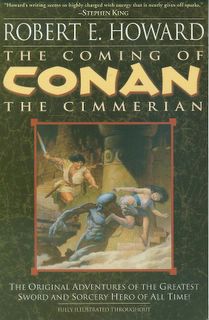
Over at
Rough Edges, James Reasoner mentions that Saturday was the 99th anniversary of Robert E. Howard's birth, which reminds me that I'd been intending to say a couple of things about a collection titled
The Coming of Conan the Cimmerian, published in trade paperback by Ballantine in 2003. This is a reprint of the much more expensive hardcover published in 2002 by Wandering Star, and it's an attempt to give us Howard's stories as they were originally published, in the order of their publication. It's pretty clear from the editorial commentary that the people who put this collection together don't approve of editorial meddling, and that they really, really disapprove of the Conan pastiches that were written by the likes of L. Sprague de Camp and many others.
So I have to say right at the start that my first acquaintance with Conan came from those very pastiches, which I encountered in the SF digests back in the 1950s. The very first one I recall reading was in a 1957 issue of
Fantastic Universe, which had a great cover of a flying demon carrying a helpless babe in his arms. The story was written by de Camp and Bjorn Nyberg, and I thought it was great. I later went on to read as many of the original stores as I could find, as well as the pastiches. I might have found Conan without ever having read de Camp's take on him, but then again, who knows? At any rate, I've always felt I owed de Camp something, but the editors of
The Coming of Conan would almost certainly not agree.
Be that as it may, last week I started reading through the stories in this recent collection, beginning with "The Phoenix on the Sword." The collection includes not only the first published version, from
Weird Tales, but also the unrevised first submitted draft. I'm a fan, not not enough of one to read the draft, so my comments apply only to the published story.
The thing that amazed me was how many "rules" of storytelling Howard violated. Most of the story is "told" rather than "shown," with a lot of it being nothing but exposition accomplished by having characters tell each other all kinds of things that they already know. There's also a shameless use of coincidence and an equally shameless
deus ex machina. Not that any of that stuff matters. What redeems the whole thing is the great action scene. When Conan starts swinging his sword and ax, heads will roll!
The next two stories in the book were rejected by
Weird Tales, and I can see why. The endings of both of them (like the ending of "The Phoenix on the Sword," in fact) are supposed to be at least shocking, if not surprising, and they're just not. (Maybe that's me, because I've read too many similar stories, and the endings would have been more effective 70 or so years ago.)
Howard didn't let a little thing like rejection bother him, and the fourth story in the book, "The Tower of the Elephant," though it has plenty of coincidence, is a much better story than the preceding ones, and the fifth, "The Scarlet Citadel" also has some wonderful stuff in it. I'm not as fond of the sixth story, "The Queen of the Black Coast," as some people are (again, the gimmick seems too predictable), but I like it quite a bit. I remember that when I first read it, many years ago, that it was one of my favorites. Hey, I was young and wildly romantic. What can I say?
There are seven more stories in this collection, and I plan to read them all sooner or later, along with those in
The Bloody Crown of Conan, which I ordered not long ago. You might be asking, "But Bill, don't you already have the Ace collections, with the pastiches included? And don't you have the Berkley collections with the original
Weird Tales versions and no pastiches? And don't you have the Ace Double with
Conan the Conquerer? And haven't you read those all before?"
My answer is, "Yes. And your point is?"






